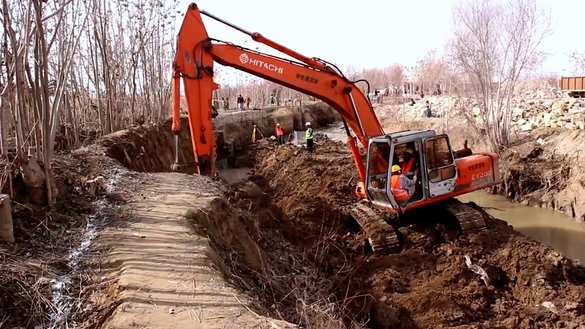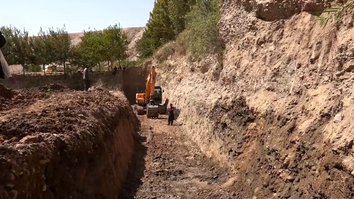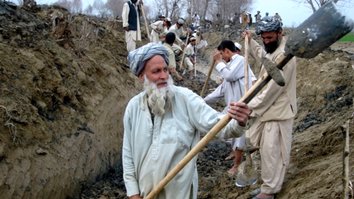KUNDUZ -- The Food and Agriculture Organisation of the United Nations (FAO) has begun the construction of a canal that will irrigate more than 9,000 jeribs (1,800 hectares) of agricultural land in Kunduz province.
Officials at the Amo (Amu) Darya regional office in Kunduz said the project, which will be implemented in Qala-e-Zal district, will cost $300,000.
Abdul Rafi Mujtaba, director of the Amo Darya regional office, said the construction work on the canal kicked off in a February 6 ceremony in Qala-e-Zal's Wakil Jangle locality. The project is expected to be completed within three months.
The Wakil Jangle locality covers a large area in the district, including several small and large villages.

In this screenshot, an excavator works on an irrigation canal February 6 in Qala-e-Zal district, Kunduz province.
"The canal is 1,200 metres long, 2.5 metres wide and 4 metres high," he said, adding that FAO has provided the funding for the project.
"Local residents have been facing a lack of irrigation water for several years. However, after the completion of the project, not only irrigation water will be ensured but also over 1,800 households will have access to clean drinking water," he added.
"Upon completion of the project, irrigation water distribution will improve and water wastage will be prevented," he said, adding that the project will provide three-month jobs for some 8,000 local residents.
Abdul Latif Nasir, an official with the implementing agency, told Salaam Times that his agency will follow the project closely and deliver high quality work.
"Our farmers suffer losses every year due to a lack of proper irrigation infrastructure such as dams, canals and retaining walls," he said.
"We are committed to implementing the project with excellent quality so that the infrastructure lasts for several years," he said.
"The benefits of building dams and irrigation canals are twofold: not only our waters will be managed properly, but also farmers' livelihoods will improve," he said.
"I am grateful to the elders in the area who have encouraged relief organisations to lay the foundation for development in their respective neighbourhoods."
"We have to remember that Afghanistan is an agricultural country and that its economy relies on agriculture and farming," he added.
Meeting farmers' needs
Farmers in Qala-e-Zal district have welcomed the construction of the irrigation canal.
"We have been facing enormous challenges from lack of water for many years," said Ghulam Haidar, 58, a farmer in Wakil Jangle locality.
"This is because our canal was damaged every year by rising water levels and farmers cannot afford to reconstruct it," he said.
"Wakil Jangle canal is located in a relatively high area, but the Aqtepa stream is located in a lower area in the centre of Qala-e-Zal district. When water flows into Wakil Jangle canal, because the area is a desert, it finds its way into the Aqtepa stream and our canal remains dry," he said.
"Unfortunately, our farmers have suffered the most for several years from the lack of irrigation water. Now that the construction work for building the canal has started, we are very happy that we will have access to irrigation water in three months," he added.
"Fighting has been going on for 40 years, and we have neither a water intake nor an irrigation canal, a road or electricity. We call on relief organisations to provide more assistance," Haidar said.
Every year, local residents have come together to temporarily fix the broken parts of the canal so that the water could reach their agricultural land, said Bismillah Rashidi, 67, a tribal elder in Wakil Jangle locality.
"However, our repair work has not lasted long because rising water levels have always destroyed the canal," he said.
"We have made repeated requests for the construction of the canal, but no organisation indicated its willingness to co-operate with us," he said, adding, "We are very happy that the FAO office is supporting us in building this very important and vital project."
Rashidi also pointed to the connectivity issues that his village faces from bad roads, which often costs patients their lives as they are unable to reach medical centres in time.
"We do not have electricity, and we live in the dark. Furthermore, we do not have a clinic, nor do we have an obstetrician-gynaecologist in the village," he added.
Welcoming construction projects
Qala-e-Zal District Governor Rahmat Shah Waqas called on local residents to fully co-operate with builders during the implementation of the project.
"The people of Qala-e-Zal district, especially farmers, have been facing many problems for years. In some areas, [residents] do not have access to enough water, and most of them have been forced to abandon their hometown and leave for other areas," he told Salaam Times.
"We hope more development projects will be implemented not only in Qala-e-Zal district but also across Kunduz, so that [residents] will have access to resources and build a better life," said provincial representative Abdul Baqi Madani.
"With the construction of the canal, I hope our farmers will be encouraged to grow other seasonal crops besides rice and wheat, and will reap a better harvest," he said.








Thank you from Obaudullah Ahmadi and your side
Reply4 Comment
The United Nations should be thanked for starting the construction of a canal to irrigate this much land. Any water flowing inside Afghanistan harms its people, but the neighboring countries take advantage of it. Japanese doctor Tetsu Nakamura worked for the people of Nangarhar in water conservation. As the United Nations spends its budget on the construction of canals, its work will be appreciated by the people.
Reply4 Comment
The United Nations is really building Afghanistan. Construction of the irrigation canals in different provinces of Afghanistan by the UN Food and Agriculture Organization (FAO) shows that, the United Nations rebuilds Afghanistan. I read this report of Salaam Times and I felt very happy. With the construction of the irrigation canal, the farmers of Kunduz province can develop their agricultural lands, and they can collect a lot of income from their agricultural land which will make their economy and Afghanistan stronger. In the current year, the United Nations started the best critical projects in Afghanistan. All these projects of the United Nations will change the fate of the poor people of Afghanistan. We, the people of Afghanistan, thank the United Nations for not leaving us alone and always being with the people of Afghanistan in these circumstances.
Reply4 Comment
By reading this news, I remembered Dr. Tetsu Nakamura's works in the the Kama, Khewa, and Beshsud districts of Nangarhar. I wish Dr. Tetsu Nakamura was alive now and could see the beauty and greenery of these districts today. Nakamura, a Japanese-Afghan, served the people of Nangarhar the most. He wanted to build the deserts and was going very fast when the enemies of Afghanistan killed him. We can never appreciate what he has done. He left his beautiful and luxurious life and came to build our homeland, but unfortunately, we could not save his life. He knew that to change Afghans' life, the water in Afghanistan must be controlled first because the land is fertile and the people are engaged in farming, so water is important for them. Nakamura was the hero of Afghans. He dedicated his work and life to improving the lives of Afghans. He worked to improve Afghanistan's water supply and agriculture, but Punjab (Pakistan) killed him by using cowardly armed men. Kunduz, where this canal is being constructed, is a very pleasing place. I wish Afghanistan's water gets controlled; dams are built on it and provide employment. Trees and plants grow green through water control. Electricity is generated, factories recover, and a systematic farming system emerges. By then, we will get released from needing our neighbors...
Reply4 Comment